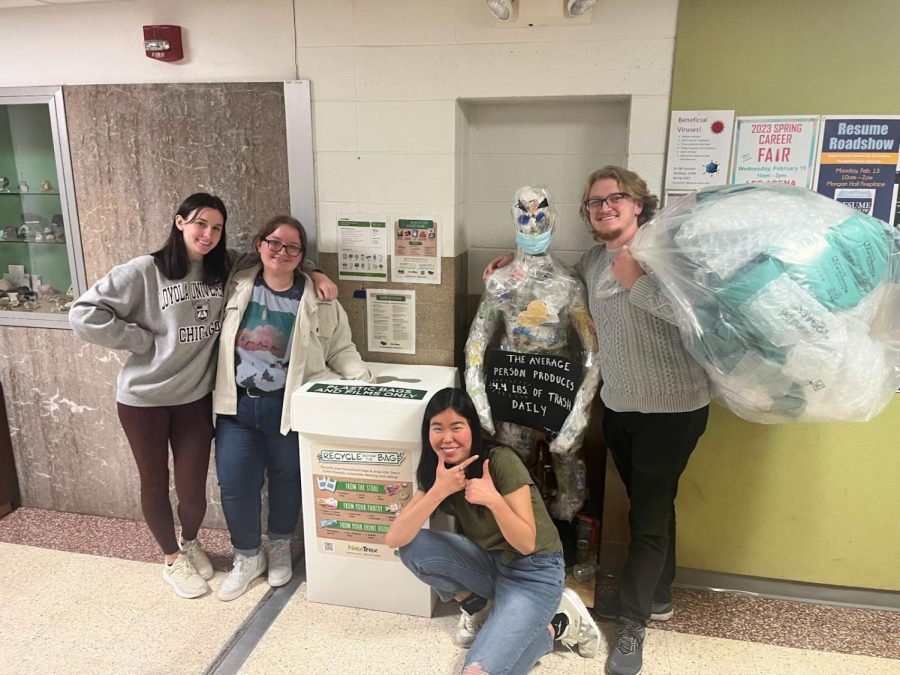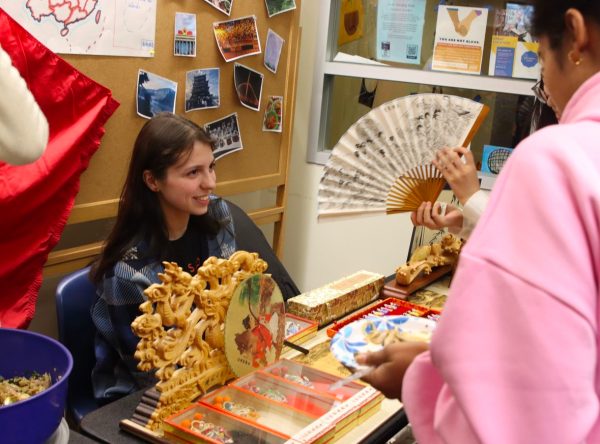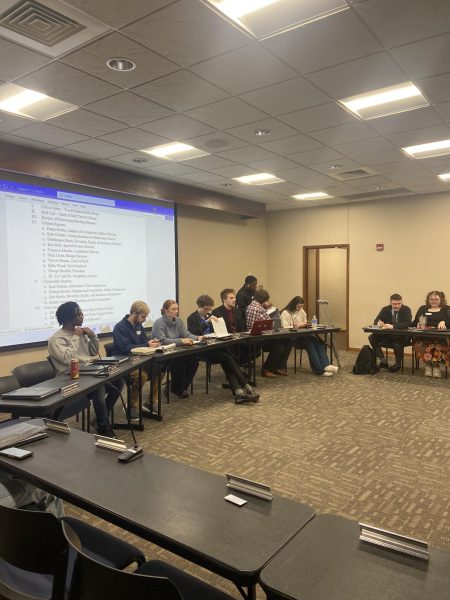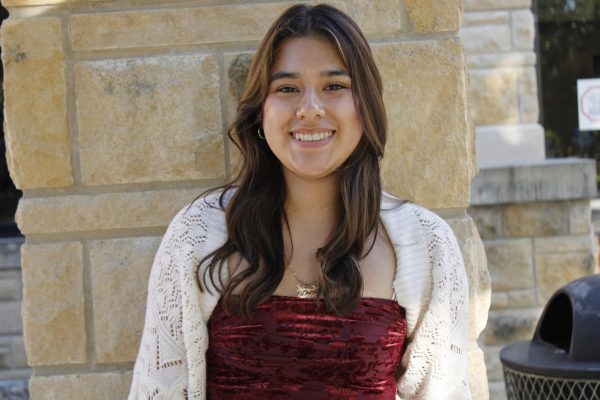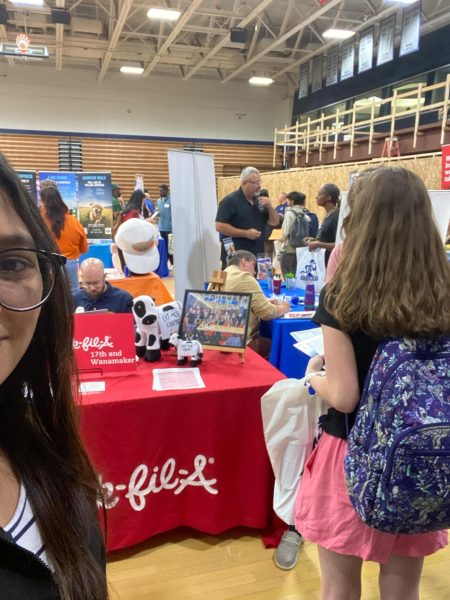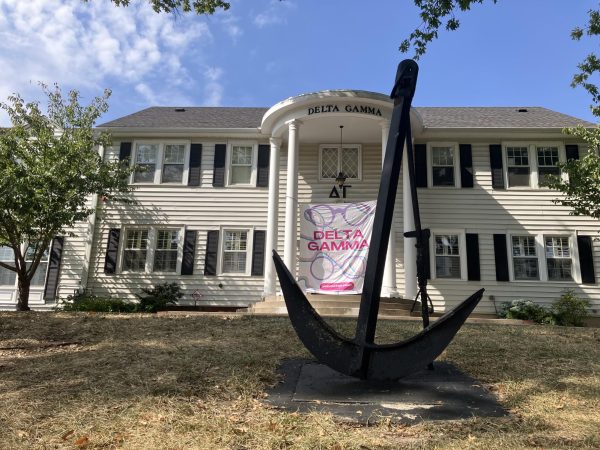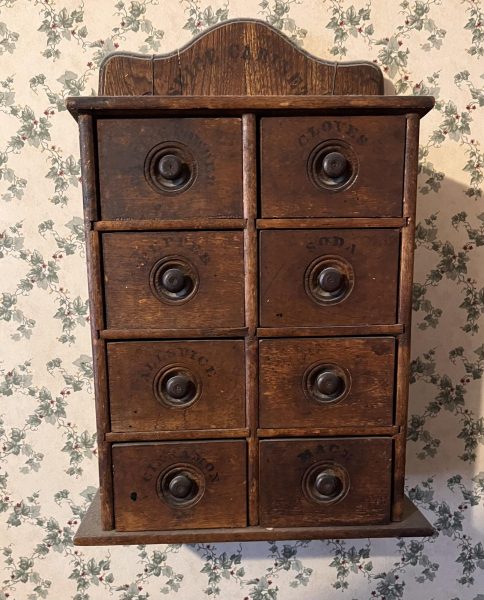Washburn biology department challenges students to a recycling contest
Biology Club members, sophomores, Mary Tyler, Desiree Thimesch, along with seniors, Samantha Kim, (Trashman) and Chris Preister, all biology majors, pose in front of their recycling collection box. On the first day the program had gathered almost 5 pounds of plastic waste.
Kaylyn Hobelman, laboratory supervisor for the biology department, recently signed Washburn University up for the NexTrex recycling challenge, in an effort to cut down on the waste produced during labs. Students from all around campus can bring plastics and films to be gathered and in turn, a bench made of recycled composite materials will be donated to the university.
Overseeing the labs meant it was up to her to get rid of the waste from various tools and instruments that are used daily. Hobelman had been taking several pounds of plastic film to a Walmart collection center thinking that what she brought would be recycled.
“We collect so many plastics, I’ve been trying to find a way to cut down on waste, cause that’s important to me,” said Hobelman. “Plus I’ve made it my responsibility to do it in the most sustainable way.”
Hobelman learned Walmart was not recycling the material being collected. Instead the workers were throwing everything away and the recycling material was being sent to the dump. Hobelman searched for a more ethical and rewarding method and found NexTrex.
NexTrex is a company that supplies schools and organizations with what they need to be collection centers for recycling.
The biology department is taking part in a challenge to collect at least 500 pounds of recycled plastics. If the target amount of waste is collected in six months NexTrex will make a bench out of the materials. Only boxes marked with NexTrex are a part of the campaign. The normal blue bins around campus are not associated with the biology department. NexTrex accepts certain types of plastics. If the plastic tears like paper it can not be recycled. If the plastic stretches when you try to tear it then it is the type of plastic that is able to be recycled.
Look for ‘#2’ or ‘#4’ with the recycle logo on the items, these will be the ones you want to include. The lack of these symbols does not mean your item should not be included. Things like grocery bags, bread bags, cereal box liners, Ziploc bags and even the packaging from your amazon orders are all acceptable plastic wraps. However, plastics like your KitKat wrappers, your PPE (gloves, masks etc.) or laminate films are not acceptable.
Improperly disposing of plastics and films sends them to landfills. This leads to pollution of the land and sea, and harms animals around the world. Therefore, having a way to decrease that would benefit everyone. Not only that, the collection, weighing and redeeming of the recyclables are mostly handled by students. Participating in the NexTrex challenge will give students the opportunity to do the right thing and be able to add this to their resumes. Right now, the biology department is the only department involved in this program, but hopefully exposure and word of mouth will lead this to be a campus wide endeavor.
Currently, there are three collection boxes in Stoffer Science Hall. One by the southeast entrance to the building, being guarded by a previous recycling project, Trashman. Another is next to the biology lab stockroom, room ST125. The last collection box is by the biology department offices, room ST202.
There is talk of putting boxes where students live on campus. President of the biology club, Desiree Thimesch, works with residential living. Thimesch has negotiated with the resident advisor to add stations into the Living Learning Center.
“If it’s more convenient for people they’ll be more likely to participate. Everyone wants to recycle, reduce our footprint and stuff, they just don’t have the proper knowledge, most people ‘wish-cycle.’ At least with this program something cool comes from our efforts.”
Recycling should be a forever process but this specific contest only lasts for six months. Hobelman started the contest Thursday Feb. 9 making Aug. 9 the deadline. Since half of this challenge period is during summer, students will have to collect more plastics in less time, which should encourage all those interested in winning.
NexTrex boxes will continue to be available to collect plastics beyond the time of this contest. That way the department has a healthy way to get rid of their plastic. Unlike the previous method, this program will keep the plastics out of landfills. Even if they fail to meet the requirements this time around Washburn can always try again.
Edited by: LeSha Davis and Simran Shrestha
Your donation will support the student journalists of Washburn University. Your contribution will allow us to purchase equipment and cover our annual website hosting costs.



